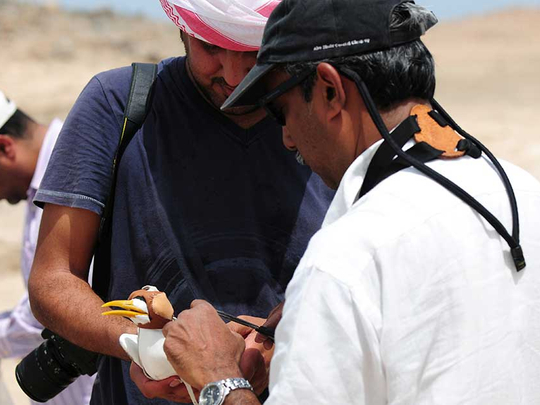
Abu Dhabi: People are removing eggs of vulnerable Socotra birds from nests due to misunderstandings about its appearance and dietary habits, an expert has said.
They are unaware of the bird’s dwindling numbers and legal consequences of their actions.
Under article 12 of Federal law No 24 of 1999, “It is prohibited to hunt, kill or capture birds, wild and marine animals identified in the Executive Order and it is forbidden to possess, transport, sell or roam with these animals, alive or dead, without obtaining licensure from the competent authorities. It is also prohibited to damage birds’ nests or destroy their eggs.”
Originating in Yemen, the black Socotra bird’s fish-eating habits had led some to believe that it competes with fishermen and is therefore a threat to their livelihoods.
Speaking to Gulf News, Dr Salim Javed, the Environment Agency Abu Dhabi’s (EAD) acting director, Terrestrial Biodiversity, said: “The bird is black, a little smelly and mainly eats eggs. People remove the Socotra’s eggs out of its nest because they simply don’t like the bird nor do they understand its significance in the environment. The offenders probably eat the eggs which has a direct impact on the birds’ well-being.”
The UAE is home to the largest population of the Socotra. This bird is currently categorised as ‘vulnerable’ — a step away from being endangered. “If this illegal capturing of the Socotra’s eggs continues in the UAE or in other countries, it is most likely going to become endangered,” he added.
Under UAE law, violators of Article 12 of Federal Law No 24 of 1999, shall be imprisoned and fined up to Dh20,000 or one of the two penalties in addition to the confiscation of the captured birds and animals.
The tern is another species of bird which faces similar treatment by residents living near the islands where the bird comes to breed every year during the hot summer months. Each bird produces two to three eggs.
“The tern comes to breed from all over the world, including places as far as Madagascar. Therefore, as UAE residents, we are responsible for welcoming and protecting the tern which seeks comfort on UAE soil. Luckily, most islands where the tern breeds are either privately owned or protected. However, the ones that aren’t, do see quite a number of people going over to the bird’s ground nest and taking its eggs.”
The EAD found this out during its regular visits to nests of tern and Socotra where it tracks the birds’ movements and notices trends.
In fact, merely coming near the birds while they rest on their nests can pose a hazard to the eggs.
“Frightening the birds means that they are forced to exit their nests and leave their eggs exposed to the sun. When this happens, the eggs become denatured and the chick’s development inside is disrupted,” he said. “Although there are stringent laws in place for people who take these birds’ eggs, there isn’t enough enforcement of the law in my opinion. Therefore, come night time, people sneak up to the birds’ nests and simply take their eggs and make them into meals,” Dr Javed added.












